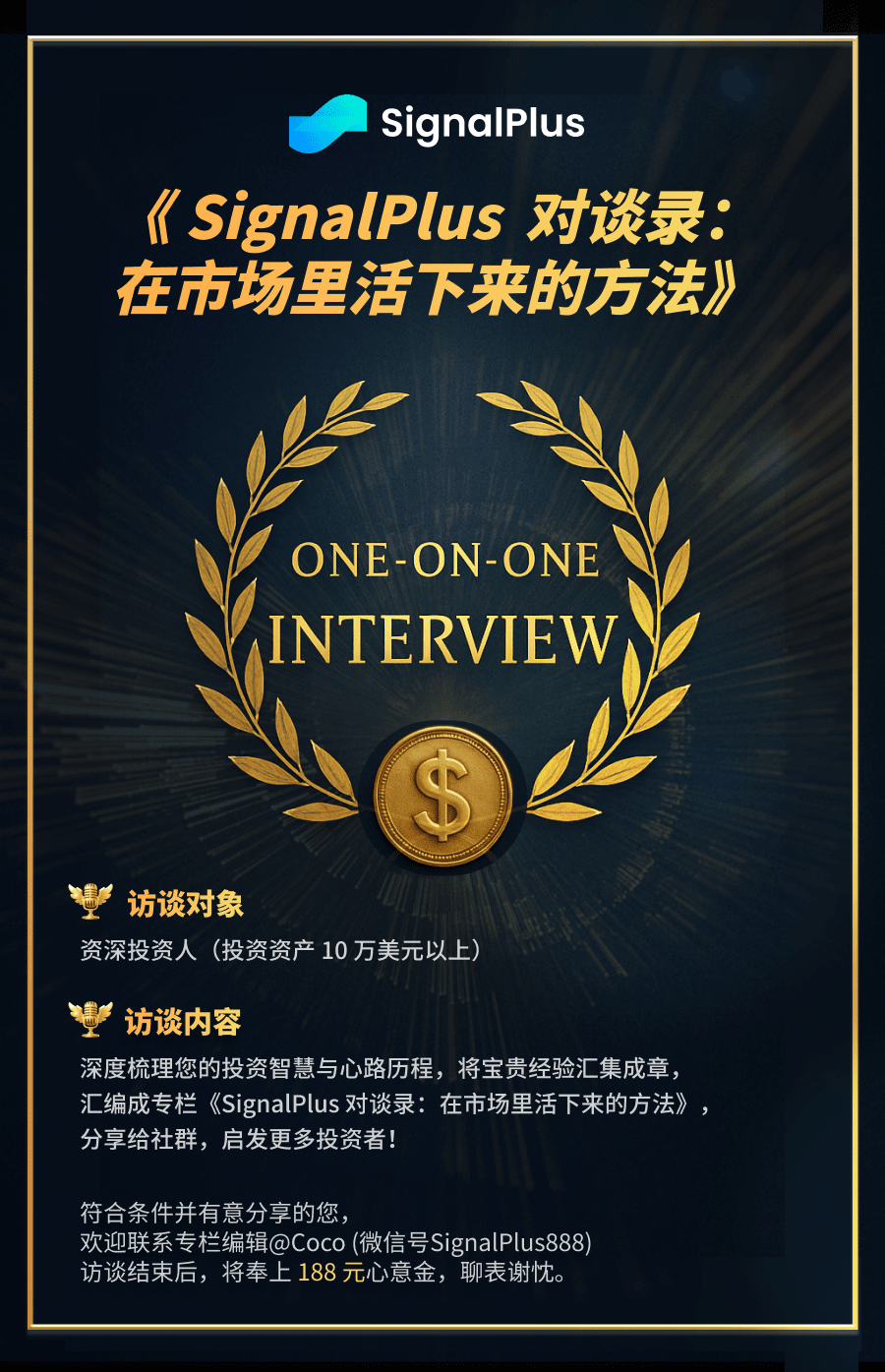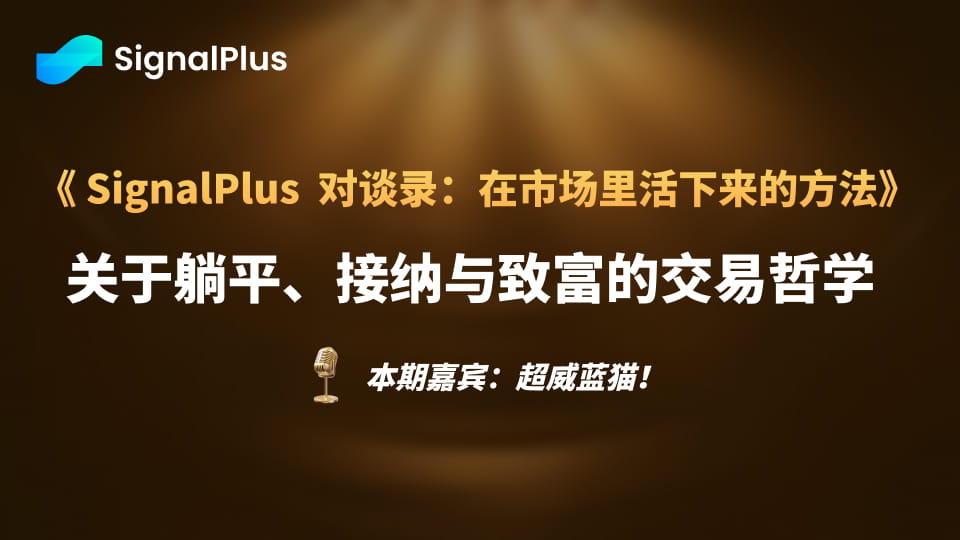
In the crypto world where "financial freedom" is the ultimate slogan, a common paradox is becoming increasingly prominent: the extreme pursuit of financial freedom has alienated countless participants into emotional slaves of profit and loss figures. The market is full of enthusiasm for Alpha, but few people discuss the inner peace of traders.
When the entire industry is obsessed with "100x returns" and "get rich miracles", a diametrically opposite voice is particularly valuable. This issue (SignalPlus Big Player Interview) guest Super Blue Cat frankly said that the highest goal of his trading system is not to maximize profits, but to pursue a scarce luxury: "peace of mind that can sleep soundly". He even suggested that a trader's entry training should not start with the K-line chart, but with the poker table.
From humanities and social sciences to state-owned enterprise investment, and then to the atypical trajectory of the Web3 world, Blue Cat has been given a unique "outsider" insight. He was able to jump out of the involution of technical indicators and build a unique trading system from the higher dimensions of psychological game and risk philosophy. In this system, the funding rate of perpetual contracts is regarded as a "psychological trap" that creates anxiety; "life anchors" such as fitness and writing have become core tools for hedging market fluctuations; and complex option strategies have been reduced to a fundamental question: "Am I already willing to accept the worst outcome?"
In this interview, we will explore how Blue Cat combines the wisdom of poker with the reality of the crypto market, how to build an indestructible trading defense system with a seemingly passive "lying flat" posture, and how to have its own psychological sovereignty in this world full of FOMO and FUD.
I. Investing in People and Trial and Error: The First Step into Crypto
SignalPlus: Please give a self-introduction first, such as your professional background and educational experience.
Super Blue Cat!: I studied in Macau before. After graduation, my first formal job was in a state-owned enterprise doing investment. Although it is a traditional industry, it is closely related to friends living in the Greater Bay Area.
Because my undergraduate major was news communication, it was a complete zero start for me to switch to investment directly. Even the enterprise's three major financial statements, which are very common for financial practitioners, and how to use free cash flow for valuation, I learned by exploring the data one by one during the three months of the epidemic at home in Wuhan after I joined the job. That experience allowed me to accumulate the most basic financial and accounting knowledge, and also understand the operation of the primary and secondary markets, including the operation of the entire bidding process.
Later, it was also by chance that I met Teacher Longxin Yan through a senior. This senior brought me into the Web3 circle, and Teacher Long reshaped my investment arsenal, methodology and underlying values. I officially entered the circle in 2021, and then I practiced and explored, looking for a model that suits me, and it has continued to this day.
SignalPlus: At first, friends in the poker circle and Salt brought you into the market, but what made you decide to stay and cultivate here? Was it the considerable return, or the drive of some kind of belief?
Super Blue Cat!: The reason why I stayed, frankly speaking, is mainly because I saw the opportunity and really made money.
I was very impressed in 2021. The first currency I bought when I first entered the circle was not Bitcoin, but a shanzhai coin on Huobi. As a result, it rose five times within a month. During that time, I almost anchored the income of the currency circle to "at least double". Of course, I later realized that this idea was a bit inflated, but the early big gains did give me a very strong confidence, and I firmly believed that there were more opportunities to stay in this industry.
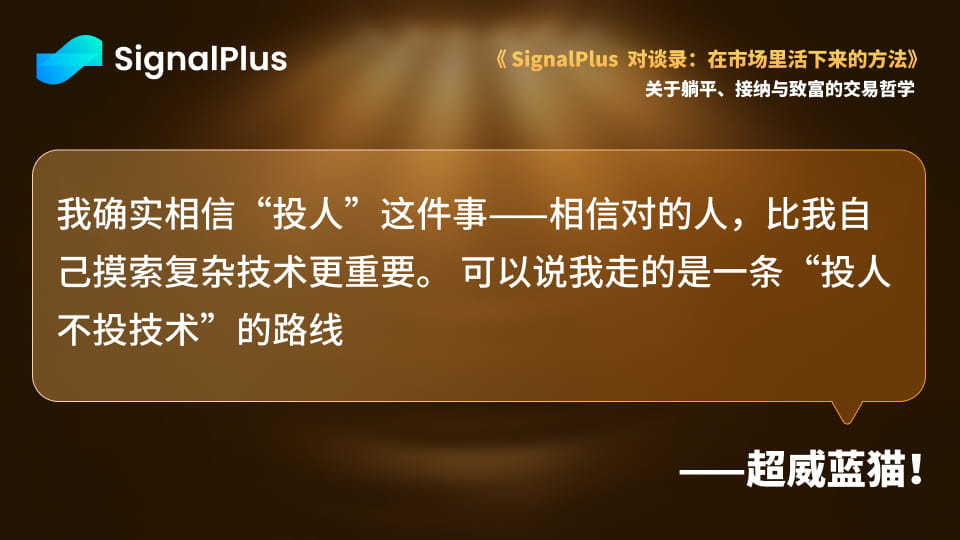
On the other hand, because I trust my previous master very much, his suggestions and judgments gave me a lot of confidence. In the financial circle, everyone sometimes lacks pure trust, but I do believe in "investing in people" - believing in the right people is more important than exploring complex technologies myself. It can be said that I am taking a "invest in people not in technology" route. After all, I am not from a professional background. Before, I mostly relied on practice and master guidance in state-owned enterprises and later when I did investment myself. So at first, I bought whatever my master told me to buy. I am a very strong executor. This "invest in people" strategy did make me money.
SignalPlus: You graduated from Wuhan University, and your philosophy is a bit in line with Lei Jun's "following the trend and investing in people".
Super Blue Cat!: Yes, including later in my communication with Salt, he also emphasized trying small positions based on trust in people.
I think the concept of trying small positions is very important, because faith is gradually established. Several friends came to ask me about how to get started with DeFi last week. I told them not to smash too much money at the beginning: "You can even take out a sum of money that you can completely lose without feeling bad, such as $10,000. Put $9,000 of it in OKX's Yu'ebao first, and then withdraw the remaining $1,000 to the chain and try it out." This gradual process is very important. I came here like this myself, investing a little bit and upgrading my positions step by step, gradually building up confidence and understanding.
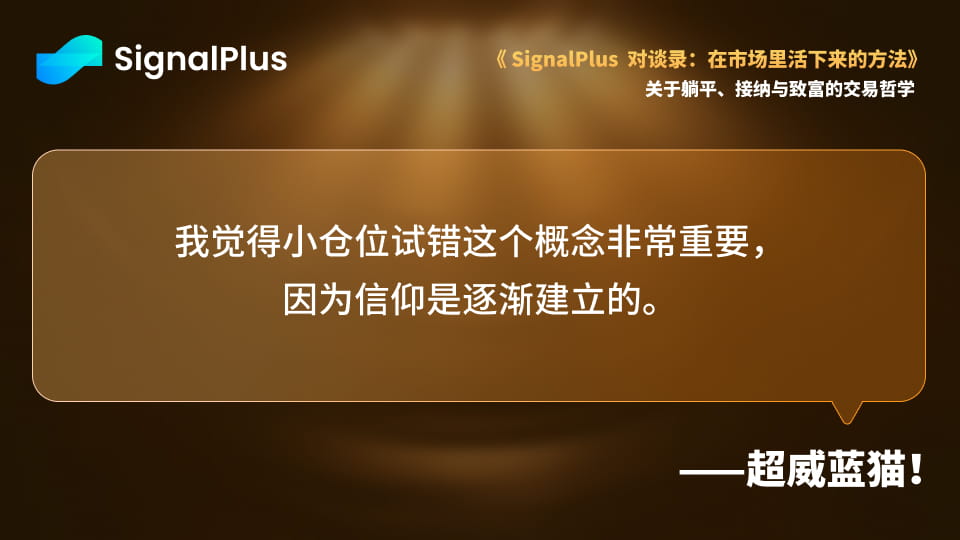
I suggest that they use this $1,000 to experience and practice in the DeFi world according to their own risk preferences. After you have tried out the feeling and adapted to the rhythm with $1,000, then consider putting in 10,000 or 100,000. This gradual process is very important. I came here like this myself, investing a little bit and upgrading my positions step by step, gradually building up confidence and understanding.
II. Slow is Fast: Independent Thinking that Persists in Daily Updates
SignalPlus: We see that you have persisted in writing essays for 200 days, accumulating a lot of fans. In this market full of noise and impetuousness, how do these two "slow motions" of independent thinking and continuous recording help you build and iterate your investment system?
Super Blue Cat!: The reason why I have been able to accomplish things is that I have persisted day after day, whether it is exercising or learning. Living without going to work requires some "anchors" to maintain the regularity, otherwise the state of the whole person will be very chaotic.
Last September, I was inspired by an essay by Teacher Longxin Yan: he mentioned that "everyone should try to build their own social media account with four-digit fans", otherwise how can others quickly recognize you? He gave an analogy, if you are a piece of gold, but others need to dig three feet to find you, then you are not as good as a stone on the roadside. At that moment, I realized that I should actively promote and expose myself. In fact, many things can be done by anyone, but the premise is that others see you doing it. After figuring this out, I started trying to build my own social media account from September last year, and persisted in writing something every day. It has been exactly 200 days now, and not only has my thinking been precipitated, but I have also slowly gathered some followers.
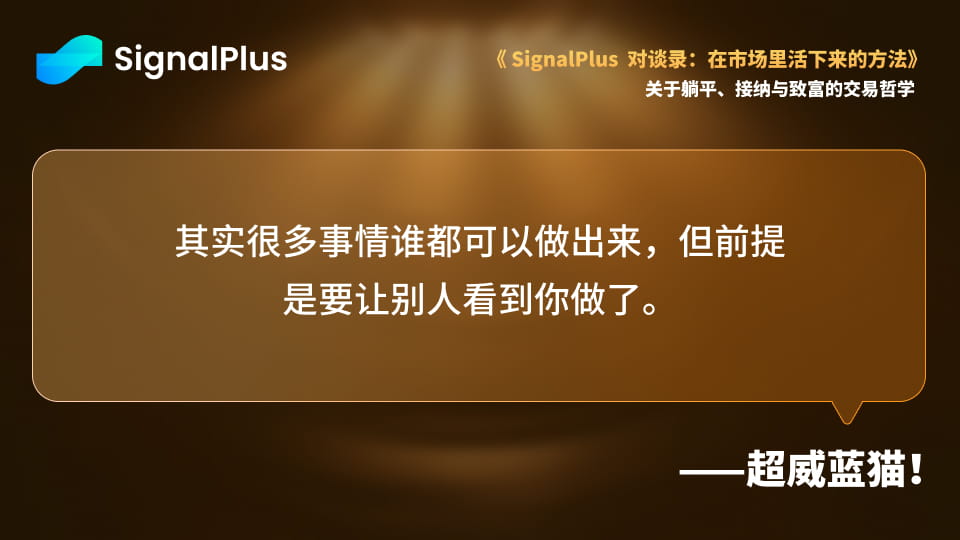
I deeply agree with what I just mentioned about "the market is full of noise". There is too much information every day and the market fluctuates too quickly. If you don't have your own rhythm, it is easy to be swept away. I used to live like a "gambler" for a while: when I first came into contact with contract trading, I installed several APPs that specifically pushed currency circle news (Golden Ten News) on my mobile phone, and adjusted the notification frequency to the highest. It can be said that there was almost no peace 24 hours a day, and I always felt that something big would happen in the next second, and it would be a big loss if I missed it. At the same time, I also turned on the price alert of OKX exchange, and the mobile phone would keep "ding ding" ringing every time the currency price moved. Later, I couldn't stand it anymore, so I simply turned off all these push notifications.
There is too much market noise, you must learn to shield interference and watch more and move less. Sometimes calming down and reducing the frequency of operations can have a better mentality to deal with market fluctuations.
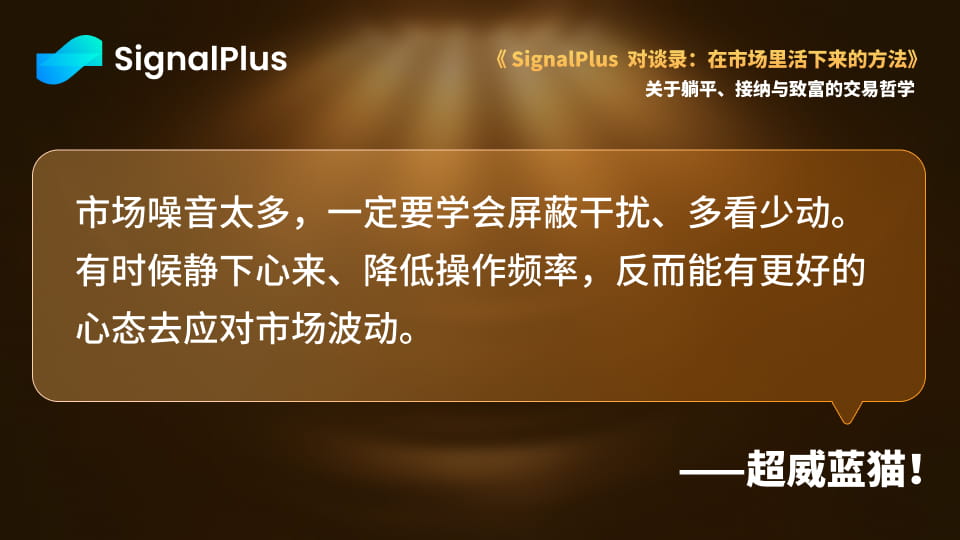
III. Transcending Profit and Loss: Trading is a Mental Cultivation
SignalPlus: Can you share how the first time you made a relatively large sum of money happened? How did you feel at the time?
Super Blue Cat!: The most impressive one was the wave from the end of 22 to the beginning of 24. The previous senior suggested buying Ethereum. I started building positions gradually from around $1800, and took the chips most of the time in the $3600-3700 range at the beginning of 2024, which is equivalent to almost doubling.
Because I had faith in Ethereum, I put a relatively heavy position at that time, so this wave of returns was quite considerable for me. The overall market environment was also very good during that time - Salt also recommended BNB, OKB and other currencies, and I basically made money after buying them. Looking back, it was almost that time when "everything I bought went up", which allowed me to successfully complete my initial accumulation.
Although we always "scold" Ethereum now (mainly because I bought some back at $3,000 later, and now I'm trapped), but it's actually just a joke and didn't really hurt my muscles and bones. I'm generally satisfied with this wave of market - after all, I made the money I should have made, and I also gained confidence.
SignalPlus: It's certainly cool to make money, but there are always times of torment in the market. Have you ever experienced a very painful retracement, or a stage where you watched others make money but you missed out? How did you get through it and survive?
Super Blue Cat!: Of course, RCH is a process of cultivating the mind for me.
After experiencing the smooth sailing of the previous wave of "everything I bought went up", I heavily bought a new project token last June, and the abbreviated name is RCH. I originally thought I could use this opportunity to earn ten times the money and directly achieve financial freedom. However, the reality is very cruel - after I bought it, RCH fell all the way.
To be honest, I was a little greedy when I first started, and I wanted to make a fortune with this RCH. But watching it keep falling, my mentality also began to waver. Especially during the worst period in July and August last year, there was almost no good news from the project side, and the comments in the community were very pessimistic every day, and everyone was complaining. I also found that RCH's product itself seemed to be less and less competitive at that time, and some promised functions had not been launched for a long time. It can be said that I was emotionally tortured during those months.
In the end, I survived by exercising every day and giving myself psychological cues. I kept persuading myself: my parents are healthy, I have enough food and clothing, I can still insist on exercising every day, and my physical condition is good; at the same time, I will soon get the opportunity to continue my studies, and everything is on the right track. Although RCH lost money, it did not really affect my life: I still eat well and sleep well.
I even figured out a truth: RCH cannot determine my quality of life. Even if it really made me earn ten times the money, I would still live the same life now. My material needs are not high. Even if I get rich overnight, I will still eat three meals a day, go to the gym, read and write articles, and there will be no earth-shattering changes. Since this is the case, I shouldn't live worse now because it lost money. My life shouldn't fluctuate around book wealth. After figuring this out, I slowly walked out of the shadow of RCH. At the same time, the project side's solid update of various functions and the steady progress of new partners have also turned me from a project speculator to a builder's mentality. Here, I would also like to advise everyone that the risks and returns of the primary market coexist. It is best to actually use the product and understand its underlying logic before participating in it. At the same time, everyone is welcome to experience the various functions of SOFA.org.
I thought I would be calm from then on and no longer be greatly affected by profits and losses. As a result, I experienced a "small breakdown" in my mentality again last November. At that time, I bought back some Ethereum at a low price, and exchanged all the SOL I bought at the same time for Ethereum. Later market changes proved that if I had kept SOL at that time, I could have at least made up for the losses on the Ethereum side, or even made a profit. When I realized this, to be honest, my mentality was a bit broken. But fortunately, I adjusted in time and comforted myself with the previous principle: "You live like this when it rises tenfold, so why bother when it falls?" So I refocused my attention on real life and stopped staring at the market all day.
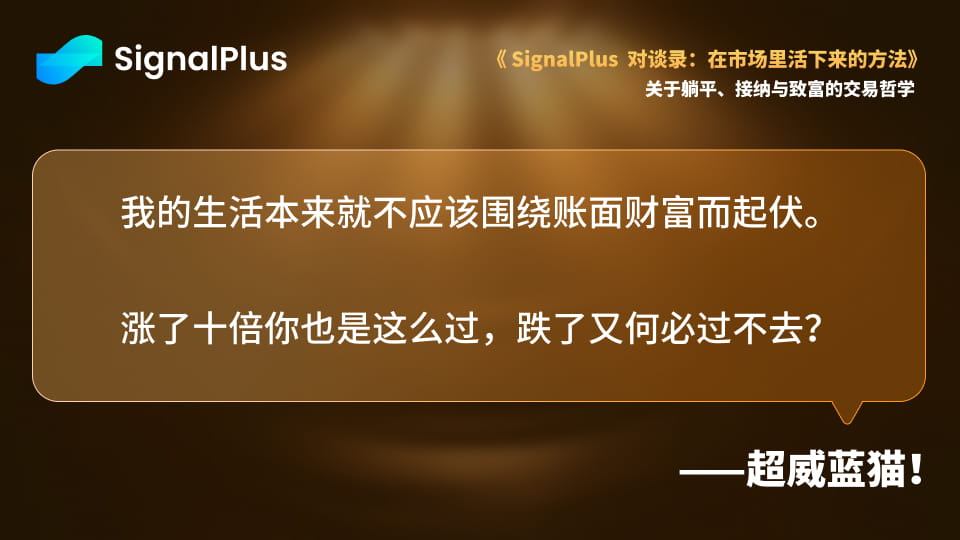
After all, as I said just now, if the currency price increases tenfold, I will still eat three meals a day, exercise, and study. If the currency price is halved, I will still live like this. After understanding this principle, I pay more attention to those daily small goals, such as writing articles, exercising, memorizing words, reading, and communicating with senior大佬s. These habits have become my weapons to heal myself.
IV. From Contracts to Options: Finding a Weapon to Sleep Soundly
SignalPlus: You also did contract trading at first, keeping a close eye on currency prices and news. But why did you finally choose options as your core trading tool and build your own trading system around options?
Super Blue Cat!: The direct reason is that the real-time jumping profit and loss figures on the contract account made me very uncomfortable and seriously affected my mentality. I don't want to open the trading software every day and see how much the account has lost. Furthermore, although I have used contracts, I have never touched high leverage. At the beginning, in order to improve capital utilization, I occasionally opened up to 2x leverage, and would replenish the margin at any time to reduce the actual leverage back to close to 1x. In other words, I have not really "bet big with small capital" through contracts. But even with low leverage, contract trading still made me very anxious.
For example: the contract position has to settle the funding rate every 8 hours. If I still hold the position in the next 8 hours, I will always think about "whether to toss a bit and earn back this funding fee by trading". This psychological pressure makes me very uncomfortable. Just like in poker, I don't like the tournament mode because there are rising blinds and antes, which give people a sense of urgency - if you don't take the initiative, the chips will be eroded, forcing you to keep participating. I prefer Cash game, where I can patiently wait for good cards. Trading is the same. The contract mode that pushes you all the time does not fit my personality.
What really made me decide to switch to options was a personal experience. At the beginning of 2024, when Bitcoin was around $40,000, I was bearish on the market outlook and wanted to establish a short position. Salt suggested that I not directly short futures, but use the options strategy "Risk Reversal" to short Bitcoin. He showed me the profit curve of this strategy, and I saw that it was indeed much safer than directly shorting with futures. So I took his advice and built a short position with options, and carried it all the way through the process of Bitcoin rising from $40,000 to $60,000 and $70,000. In the middle, Salt also helped me allocate margin to ensure the safety of the position. Although that wave of shorts ended in a loss, the loss was not much, completely within the acceptable range. If I had used contracts to carry such a large increase at the beginning, I would probably have been liquidated and nothing would have been left. This battle made me realize the advantages of options in risk control, and since then I have become interested in options.
SignalPlus: I noticed that you mentioned a concept of "lying flat covered" in your article. Is this a strategy or a mentality?
Super Blue Cat!: It is more of an investment mentality and trading philosophy of "no regrets once a decision is made". Many friends understand the principle of covered strategy, such as selling put options (Sell Put), theoretically you should take delivery of the goods when it falls to the strike price. But in reality, when the price really falls to the right place, many people are afraid to take it because of fear, resulting in a disconnect between planning and execution, and falling into pain.
The core of "lying flat covered" is "unity of knowledge and action". Before opening a position, you must think clearly and fully accept the worst outcome. For example, if I sell a Put, I ask myself: "If it falls below the strike price, am I willing to buy this currency at this price?" As long as the answer is yes, then there is no uncontrollable risk for me in this transaction, and I don't even need to pay attention to the complex Greek letters all the time, because everything is within the plan.
The extension of this mentality is my understanding of "impermanent loss". When I provide liquidity (LP) in DeFi, I only choose currencies that I am willing to hold for the long term. Therefore, when the currency price falls and the number of currencies in my LP position increases, I do not regard it as a "loss", but as a "scheduled fixed investment and position building". As long as the final result is acceptable to me, the fluctuations in the process are no longer important.
As Salt said, retail investors should pursue "Tao" rather than "Shu". I frankly admit that I still don't understand many advanced mathematical models. Instead of struggling in a field that I am not good at, it is better to invest in a way that makes me comfortable and sleep soundly within my circle of competence. The ease and health of mind brought by this method are in themselves a kind of "invisible income".
SignalPlus: Psychology is indeed more important than mathematics in investment sometimes. Maintaining a good mentality is better than knowing many formulas.
Super Blue Cat!: Yes, just like in poker, many people think that playing cards is a profound probabilistic game, but in fact mentality and discipline are more important. As long as you manage your funds well, control your emotions, and understand some basic card principles, it is enough to beat 95% of the players on the market. As for the remaining 5% of the top players, we are not fighting for the first place in the world, it is enough to win money steadily, there is no need to fight with that 5% to the death. I have this attitude when playing cards, and the same is true for investment.
V. Newbie Guide: Stay Calm, Embrace Options
SignalPlus: Which functional modules of SignalPlus have been most helpful to you in the process of using it?
Super Blue Cat!: First of all, I want to say that the AI Q&A function built into SignalPlus has been very helpful to me. When I first started studying DeFi and options, there were many concepts I didn't understand, such as what "impermanent loss" meant, how certain complex strategies worked, and so on. If you search online, the explanations are often very obscure; if you ask people, sometimes they think your foundation is too poor and are unwilling to explain in detail. Later, I found that there is a ChatGPT in SignalPlus that specializes in answering financial questions, and I threw the questions I didn't understand to it. For example, "What is impermanent loss" and "What is a risk reversal strategy", it can give easy-to-understand explanations. It can be said that it helped me solve many basic doubts. Compared to the advanced functions in SignalPlus, this AI assistant seems simple, but it is really useful for us novices.
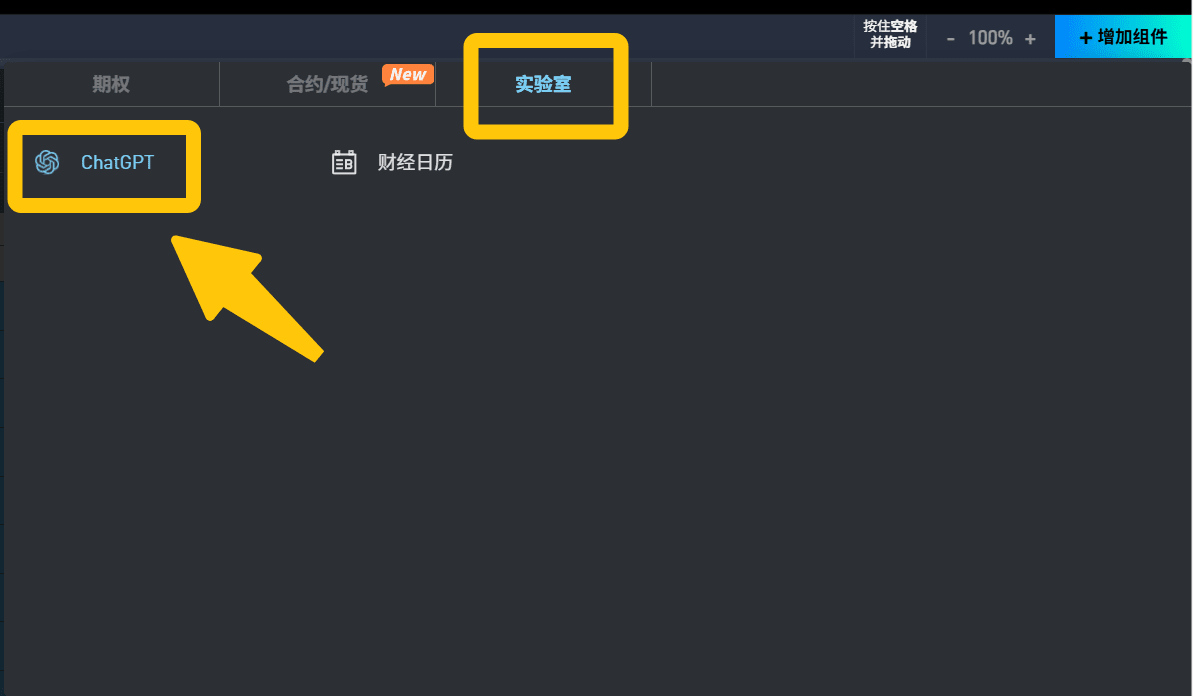
Secondly, many of the professional tools provided by SignalPlus are free, which surprised me. Features like automated order books (Auto Book) and volatility surfaces used to require advanced subscriptions to view on TradingView or other platforms. And these data analysis tools can be used directly on SignalPlus. I remember when I first used SignalPlus, I didn't quite understand how to evaluate margin occupation. Later, I found that SignalPlus has a "Risk Scenario" that is particularly useful.
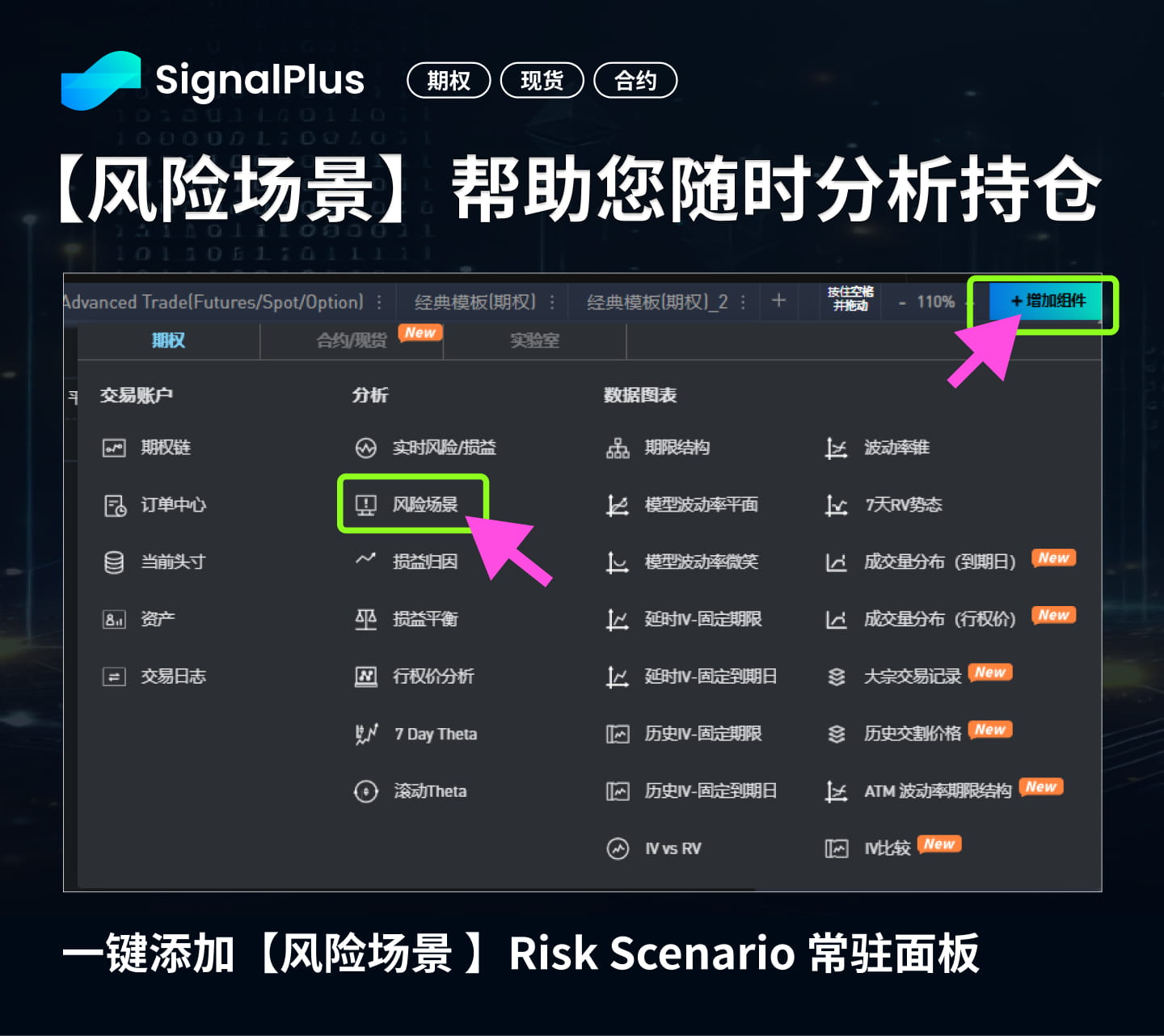
Now every time before placing an order, I open it, pull the market to extreme situations (such as a 10% rise or a 20% fall), and see what the margin occupation and profit and loss of my position will become under extreme market conditions. If the loss and occupation are within my acceptable range in the worst case, then I will open a position with peace of mind; if I pull it and find that it will be liquidated in extreme cases, then I will adjust the position or not open it at all. This has become my must-do homework before opening a position. And as far as I know, many exchanges do not provide such simulation tools, and it is difficult for traders to predict the tail risk of their strategies in advance. But on SignalPlus, I can see very intuitively whether my portfolio position will be liquidated, how much margin is needed, etc. in extreme market conditions. I use this function the most, and it is also the most in line with my risk management ideas. I also suggest many friends in our group to click on it before placing an order to see - see clearly what will happen in the worst case, and then decide whether to do it, which is more secure.
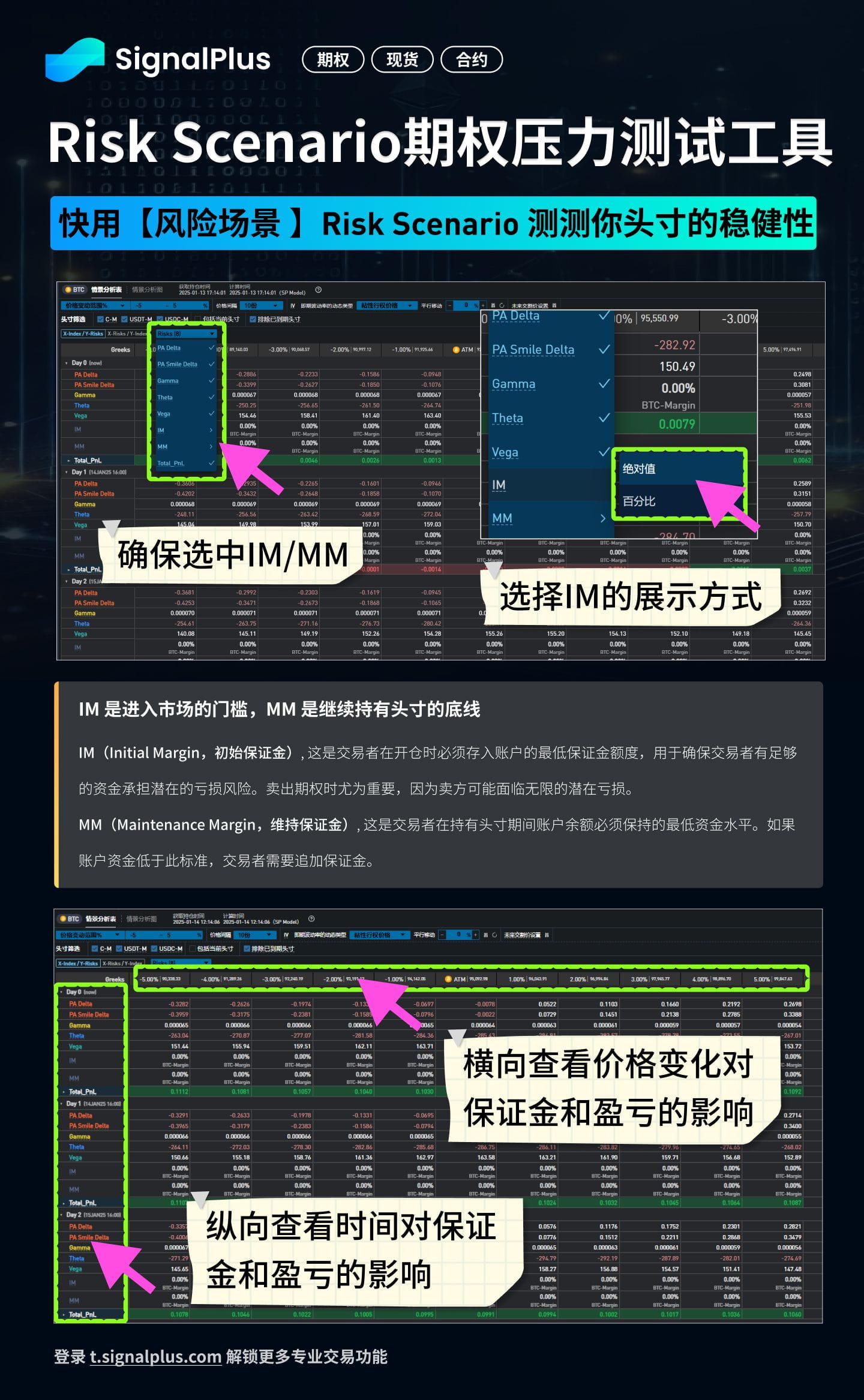
SignalPlus: Facing this market full of temptations and traps, what advice do you have for newcomers?
Super Blue Cat!: The first point I want to mention to newcomers is: never quit your job and All in to speculate on coins at the beginning. Even if you are very interested in the crypto world, try to keep other main jobs or sources of income in the early stage and invest with spare money. This way, even if you encounter losses or bear markets, your life will not be dragged down, and your mentality will be much better.
Second, cultivate your own trading literacy. I suggest that newcomers can first play poker, do some simulated trading training, etc., to learn emotional management and discipline execution. Many people only see the opportunity to get rich when they first enter the market, and do not realize the importance of risk management. Always remember: the worst situation is usually worse than you think. Make psychological preparations, such as assuming that you may lose 10 or 20 consecutive transactions (instead of just losing two or three), and see if you can bear it. Just like we often say when playing poker: amateur players should prepare at least 20-30 times the level of buying in funds to cope with fluctuations, and professional players even need to prepare nearly 100 buy-ins - many newcomers have no concept of this at all, and often lose their principal after a few losses. Therefore, it is necessary to have enough funds and patience to survive a series of possible losses, and only by surviving can you have the opportunity to wait for the market.
Third, try to use options, a "limited risk" tool, to replace high-leverage contracts. Salt always says: "Buying options is a leverage that will not be liquidated." You can lose at most the premium, but you always have a chance to turn around. More importantly, options can also bring an unexpected "emotional value". For example, if you buy a call option that expires in six months, it means that for the next five months or so, you will live in the hope of "getting rich tomorrow". This positive attitude can support you through many difficult moments and allow you to speculate without affecting your normal life and work.
I suggest that newcomers learn to use professional tools like SignalPlus as soon as possible. Don't be intimidated by its professional interface. It can help you manage all your positions centrally and clearly understand your risk situation, which is essential for establishing good trading habits. First find a way to get some positive feedback, even if it's just a small profit. With confidence, you can survive in this market for a long time.
SignalPlus: Thank you for Blue Cat's wonderful sharing. Finally, can you share your social media account?
Super Blue Cat!: Okay. My Xiaohongshu and Douyin are both called "Super Blue Cat!", be sure to add an exclamation mark. The WeChat official account is called "Blue Cat's Daily Essay". Welcome everyone to follow, communicate, and become stronger together.
After reading the story of Super Blue Cat!, do you also feel the same way? In your investment career, have you also formed a unique way of playing and mental method?
(SignalPlus Interview: How to Survive in the Market) is looking for experienced investors like you.
If you are a senior player who manages investment assets of more than $100,000, we sincerely invite you to participate in our one-on-one in-depth interview. We are eager to understand your unique investment style and winning strategy, and are willing to invest professional resources to organize your valuable experience into in-depth articles and share it with the entire community.
Your success deserves to be seen. We look forward to hearing from you!
